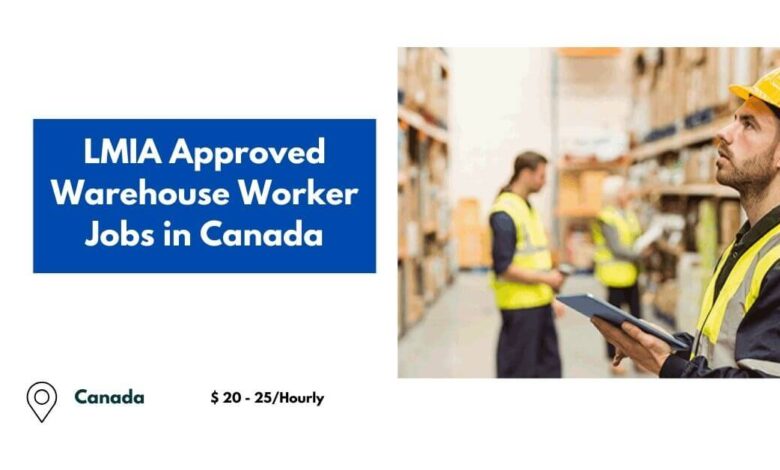LMIA Approved Warehouse Worker Jobs in Canada 2025

Canada’s warehousing sector is one of the most accessible industries for foreign workers, offering a variety of opportunities across the country. The Labour Market Impact Assessment (LMIA) is a crucial step for foreign workers seeking to obtain work visas for warehouse jobs in Canada. This guide will explore the LMIA process, the requirements for warehouse worker positions, and the opportunities available in the Canadian logistics and warehousing industry.
Understanding LMIA-Approved Warehouse Worker Jobs:
LMIA stands for Labor Market Impact Assessment, a document that an employer in Canada must obtain before hiring foreign workers for certain positions. For warehouse worker jobs, obtaining an LMIA is an essential part of the process for foreign workers seeking employment in Canada.
Key Details of LMIA-Approved Warehouse Worker Jobs:
- Job Title: Warehouse Worker
- Job Locations: Various locations across Canada, including large cities such as Toronto, Vancouver, Calgary, and Montreal, as well as smaller towns with high logistics and warehousing activity.
- Salary: The average wage for a warehouse worker in Canada is approximately CAD 20 per hour, although this may vary based on location and employer. In certain high-demand regions, wages may exceed this average.
- Job Type: Both full-time and part-time positions are commonly available.
How to Secure a Job as a Warehouse Worker in Canada?
For foreign workers to legally work as warehouse employees in Canada, it’s crucial to understand the LMIA process and visa requirements.
1. Understanding the LMIA Process
To apply for a work visa under the LMIA framework, an employer must first demonstrate that there are no qualified Canadian citizens or permanent residents available for the job. This involves:
- Employer’s Application for LMIA: The employer submits an LMIA application to Employment and Social Development Canada (ESDC), proving the need to hire a foreign worker.
- Positive LMIA: If the application is successful, the employer receives a positive LMIA, which confirms the need for foreign labour.
- Job Offer: Once the employer receives the positive LMIA, they can extend a formal job offer to the foreign worker.
2. Applying for a Work Permit
Once a foreign worker receives a positive LMIA and job offer, they can apply for a work permit to legally work in Canada. The work permit application process involves submitting various documents to Immigration, Refugees, and Citizenship Canada (IRCC), such as:
- The positive LMIA
- A formal job offer letter
- Proof of qualifications (e.g., relevant certifications or work experience)
- Proof of financial support during the stay in Canada
Tip: Be sure to check if your country of origin requires a Temporary Resident Visa (TRV) or an Electronic Travel Authorisation (eTA) to enter Canada.
3. Required Documents for Work Permit Application
To apply for a work permit, foreign workers will need to submit:
- A Valid Passport: Must remain valid for the entire duration of the work permit.
- LMIA Approval: A copy of the positive LMIA issued by ESDC.
- Job Offer Letter: A letter from the employer detailing the terms and conditions of employment.
- Proof of Qualifications and Work Experience: Include certificates and letters of reference that demonstrate your eligibility for the role.
- Police and Medical Clearance: In some cases, applicants may need to undergo a medical exam and submit police clearance certificates.
Requirements for Warehouse Worker Jobs in Canada:
The following is a list of key requirements for most LMIA-approved warehouse worker positions:
- Age: Candidates must be at least 18 years old to apply for warehouse roles.
- Education: While a high school diploma is typically sufficient, specific certifications like forklift operation or WHMIS (Workplace Hazardous Materials Information System) may be required.
- Experience: Previous warehouse experience is often preferred but not always mandatory. On-the-job training is provided for most roles.
- Physical Fitness: Many warehouse roles involve heavy lifting, standing for long periods, and other physically demanding tasks.
- Language Proficiency: A basic understanding of English or French is required to ensure clear communication in the workplace and follow safety protocols.
- Driver’s License (Optional): Some roles, like forklift operator positions, require valid driver’s licenses or specialized equipment training.
- Clean Criminal Record: Employers often require background checks to ensure that applicants have no serious criminal history.
Benefits of LMIA-Approved Warehouse Worker Jobs:
Working in an LMIA-approved warehouse job in Canada offers a range of benefits:
1. Visa Sponsorship:
Once a foreign worker secures an LMIA-approved job, the employer can sponsor their work permit, allowing them to work legally in Canada.
2. Permanent Residency Pathway:
Many foreign workers in LMIA-approved positions can eventually apply for permanent residency through immigration programs such as the Canadian Experience Class or Provincial Nominee Program (PNP). Warehouse jobs in Canada can be a stepping stone to permanent settlement.
3. Competitive Pay and Job Security:
With an average wage of CAD 20 per hour, warehouse workers in Canada enjoy competitive pay. Many warehouse positions also offer job stability, as the demand for workers in logistics and warehousing continues to rise.
4. Skill Development:
Warehouse roles offer on-the-job training in a variety of skills, from inventory management to equipment operation. Opportunities for upskilling and career development can lead to higher-paying and more specialized roles.
5. Health Benefits and Work-Life Balance:
Many employers in Canada offer health insurance, paid vacation, and retirement savings programmes, contributing to job satisfaction and overall well-being. In addition, many warehouse positions offer flexible work schedules, making it easier for workers to maintain a healthy work-life balance.
6. Diverse Work Environment:
Canada’s multicultural society means that warehouse environments are often diverse, fostering teamwork, learning, and cultural exchange.
Common Warehouse Worker Roles in Canada:
Various roles are available in the warehousing industry in Canada, each requiring different skills and responsibilities:
- Forklift Operator: Responsible for operating forklifts to transport goods in the warehouse.
- Material Handler: Moves products and materials within the warehouse, ensuring items are stored in the correct locations.
- Order Picker: Selects items from shelves to fulfil customer orders.
- Packer: Ensures goods are packaged securely and meet quality standards before shipment.
- Warehouse Manager: Oversees warehouse operations, including inventory management and employee performance.
- Logistics Coordinator: Plans and coordinates the movement of goods within the warehouse and ensures timely shipments.
- Warehouse Maintenance Worker: Maintains warehouse equipment and ensures safety standards are met.
Tips for Applying for LMIA-Approved Warehouse Jobs:
Here are actionable steps to help foreign workers secure warehouse positions in Canada:
1. Research Employers:
Look for companies in Canada that are authorised to sponsor foreign workers for LMIA-approved positions. Larger retailers like Amazon, Walmart, and Home Depot frequently hire warehouse workers.
2. Use Job Portals:
Visit job boards like the Government of Canada Job Bank, Workopolis, and Indeed to search for warehouse jobs that offer visa sponsorship. These websites often feature filters to identify LMIA-approved positions.
3. Submit Your Application:
Once you’ve found an eligible position, submit your application promptly. Ensure your resume, cover letter, and LMIA approval documents are all included.
4. Follow Up:
After submitting your application, it’s essential to follow up with the employer to demonstrate your interest. If shortlisted, you may be invited for an interview, either in person or virtually.
5. Apply for a Work Visa:
Once you’ve received a job offer, begin your application for a Canadian work visa. Be sure to include all required documents, such as your LMIA approval and job offer letter.
Conclusion:
The Canadian warehousing industry presents an attractive opportunity for foreign workers, with competitive pay, long-term job stability, and a clear pathway to permanent residency. By understanding the LMIA process, meeting the job requirements, and following the necessary steps for work permit application, foreign workers can successfully navigate the Canadian immigration system and embark on a rewarding career in Canada’s logistics sector.
Frequently Asked Questions:
-
How do I get an LMIA-approved job offer from Canada?
To receive an LMIA work permit, your Canadian employer must first apply for and receive a positive LMIA from the ESDC. Once the LMIA is approved, the foreign worker can apply for a work permit.
-
Are warehouse workers in demand in Canada?
Canada’s booming economy and growing logistics sector have created a high demand for warehouse workers across the country.
-
What are the duties of a warehouse worker in Canada?
Warehouse workers in Canada handle various tasks, including receiving deliveries, sorting and storing items, operating forklifts, managing inventory, and preparing products for shipment. to obtain a job offer and work permit that have been approved by the LMIA.



